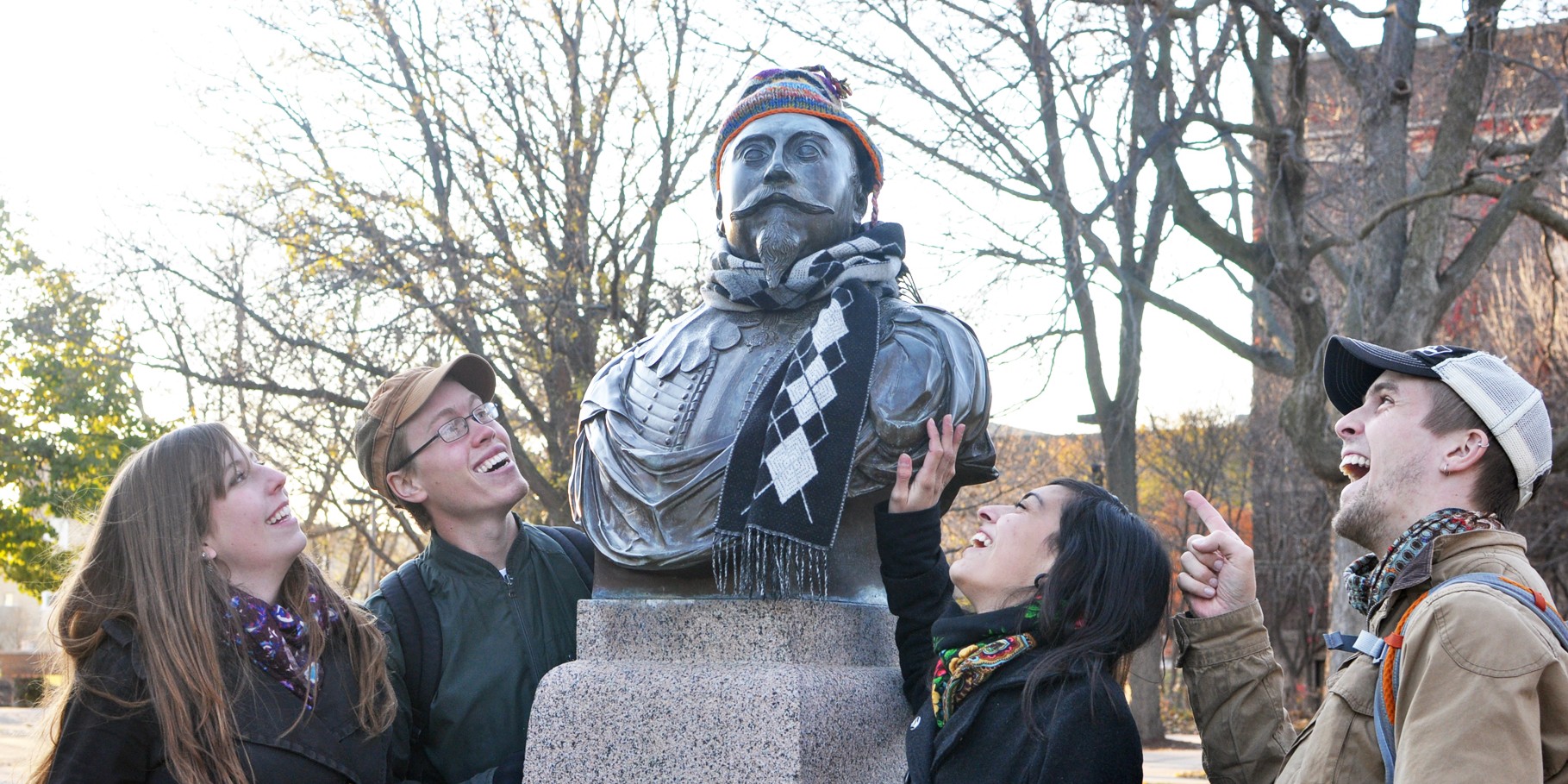Fast Facts
Occupation: King of Sweden
Born: Stockholm 1595
Married: Maria Eleonora of Brandenburg
Successor: Daughter Christina
War Attire: God was his armor
Accredited Names: “The Golden King,” “The Lion of the North” and “the Great”
Find him: Outside of Old Main and in the Jackson Campus Center
King Gustav II Adolf, who ruled Sweden from 1611 until his death in 1632, is celebrated as the namesake of Gustavus Adophus College. Born in Stockholm, Gustav will be celebrating his 417 birthday this Dec. 9, 2011.
At 17 years of age, Gustav inherited the Swedish throne after his father, Karl IX, passed away. In 1620 Gustav married Maria Eleonora of Brandenburg, who chose him over a number of other royal suitors. They had a daughter together named Christina, who, after the passing of her father, became queen of Sweden.
As seasons change on campus, Gustav can be found observing nature’s glory between Old Main and the Edgar M. Carlson Administration Building. He can also be found hanging in the Jackson Campus Center watching Gustie faces pass by.
He has been dubbed “The Golden King” and “The Lion of the North” by those who knew him, presumably inspiring the creation of the Gustavus lion mascot and lion head emblem. Gustav is also the only Swedish monarch to officially be called “the Great,” which occurred shortly after his death.

Some classes that Gustav would be checking out for the upcoming spring semester may have included “a political science class due to the importance of diplomacy in his life, a language class as he knew ten different languages, a history class and I would guess something in the classics. He tended to create a propaganda image for himself, he has a largely made up legacy,” Assistant Professor in History and Scandinavian Studies Glenn Kranking said.
Gustav’s favorite spot on campus Gustav could be the Folke Bernadotte Library. As he conquered land, Gustav and his troops would pillage the libraries for their books. He brought these books back to his homeland and re-established education in Sweden.
Along with being king, Gustav was involved in other activities such as military engineering and strategy. Through his involvement in these activities he was labeled “the Father of Modern Warfare” for his unique battlefield techniques. “He was a military genius,” Kranking said.
Like the person who is deemed leader of a group project in class, Gustav became power hungry and created a strong bureaucracy in Sweden to gain more power and resources for his involvement in wars. Gustav exerted this power and expanded the Swedish empire becoming a popular person in history for nationalists and for reclaiming the glory of Sweden.
His success as a strategist influenced future rulers such as Napoleon I of France and General George S. Patton. Gustav’s mission for more power and glory encouraged him to take a leadership role as commander of the Lutheran cause in the Thirty Years’ War as they were being pressured to convert to Catholicism.
At the end of the war, Sweden was almost all Protestant when Gustav, a defender of the Protestant faith, was killed leading his troops into the battle at Lutzen in Germany.
Gustav would not have been one to spend much time in Lund, and due to his large size his troops left his body in Germany after his death. They did, however, bring his heart back to his wife so that he could live on in Sweden forever.
Some Gusties remember Gustav fondly and feel that he is a friend on campus.
“Gustavus is my homeboy,” Junior Environmental and Geology Major Jake Bruihler said.
Others have a different opinion.
“He is fondly remembered in parts of Europe such as Finland and Estonia for his emphasis on education reform. In other parts however, such as Bavaria, he is not so fondly remembered,” Psychology Professor, and former Gustie of the Week, Tim Robinson said.
Like Sweden now, Gustav is remembered as a positive figure in history, with some music written for him and the celebration of Gustavus Adolphus Day on Nov. 6, despite some of the negative events he was involved in.
“The Sweden of today is a society that values openness, equality and peaceful engagement. It is a country of diversity but one that continues to struggle. It is not a perfect society, and it does not have a perfect and always glorious history,” Kranking said.
Something that Gustav would have told today’s Gusties would relate back to his mission on the field.
“Work on your prestige and honor. Focus on the importance of gaining and expanding your glory,” Kranking said.

One thought on “Gustie of the Week: King Gustav II Adolf”
Comments are closed.